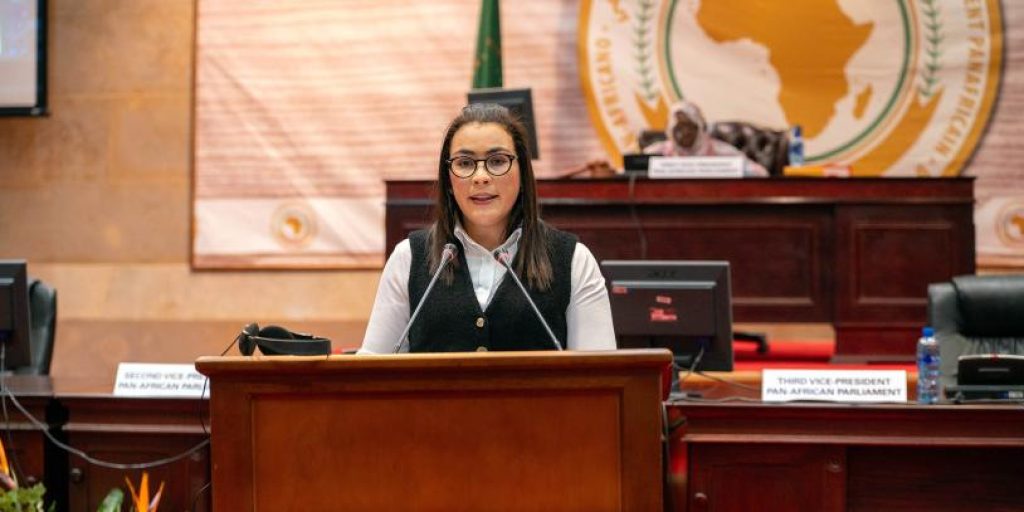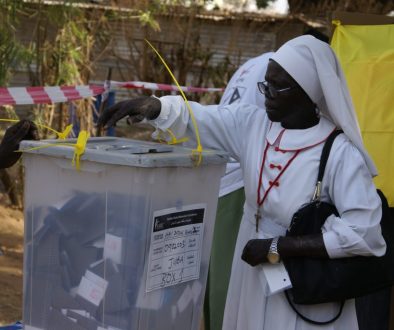‘Controlling data is essential to avoid digital colonialism, extractivism’
 At the 5th Ordinary Session of the 6th Pan-African Parliament in Midrand, South Africa, legislators and experts placed Africa’s data sovereignty, AI governance and responsible digital innovation at the forefront of the continent’s transformation agenda, emphasising the need for urgent, African-led action to avoid becoming a ‘digital colony’ while harnessing the Fourth Industrial Revolution for inclusive development.
At the 5th Ordinary Session of the 6th Pan-African Parliament in Midrand, South Africa, legislators and experts placed Africa’s data sovereignty, AI governance and responsible digital innovation at the forefront of the continent’s transformation agenda, emphasising the need for urgent, African-led action to avoid becoming a ‘digital colony’ while harnessing the Fourth Industrial Revolution for inclusive development.
Hon. Behdja Lammali, (Algerian) Chairperson of the Committee on Transport, Industry, Communications, Energy, Science and Technology, opened the discussions, saying, ‘Africa continues to lag behind in digitalisation, innovation and AI adoption, risking long-term negative impacts on our continent and our people’.
‘We must align our strategies with Agenda 2063 to advance digital health, smart industrialisation, and responsible AI use while protecting privacy and personal data.’
Reflecting on the outcomes of the First Parliamentary Digital Summit, Hon. Lammali noted, ‘We covered critical areas including AI training, data protection and digital health, discussing the role of parliamentarians in advancing AI and policy harmonisation’.
She called on Member States to ‘develop model laws on AI, data protection and privacy aligned with Agenda 2063, and to ratify and domesticate the Malabo Convention to address emerging technologies, AI, cross-border data flows and cyber threats’.
She added that ‘Africa must build a secure, inclusive, sovereign digital and AI future that aligns with the Africa We Want under Agenda 2063, ensuring data protection, AI for development, local innovation and equitable benefits for all Africans, from North to South, East to West’
Prof. Mirjam van Reisen of Leiden and Tilburg Universities, who presented on ‘Building a continental framework for AI, Data Sovereignty and Responsible Digital Inoovation’, highlighted the urgency for Africa to take ownership of its data.
‘Artificial Intelligence is now embedded in everyday tools and platforms and is essential for economic growth in Africa, with the potential to add $3-trillion to Africa’s economy by 2030,’ she said.
Van Reisen warned, ‘Africa risks losing control over its digital data, with it being exported for economic gain in the United States, China and Europe without African oversight’.
She continued, ‘Controlling data is essential for controlling AI tools and protecting African interests – current centralised models of data storage and AI development reinforce inequality’.
She drew on Africa’s traditions, saying, ‘Just as traditional communities gathered under trees to find solutions, Africa now needs decentralised data systems through decentralised web and edge computing to build sovereignty over AI’.
Van Reisen underlined, ‘Africa should become the first continent fully data sovereign, using African data and legacy to shape “African Intelligence” for AI, avoiding digital colonialism while leveraging AI for African-led growth and problem-solving’.
Dr Antony Mveyange, Director of Programmes at the African Population and Health Research Centre, reinforced the imperative for Africa to secure data sovereignty to ensure AI drives socio-economic development.
‘AI is transforming healthcare, education, agriculture and public policy in Africa, but African data is often stored and processed outside the continent, risking misuse and loss of control, he said.
Mveyange explained, ‘AI models often rely on non-African datasets, leading to biases and poor applicability to African contexts’.
He urged African governments to ‘build legal, technical and governance frameworks to protect data and ensure it benefits African citizens’, emphasising ‘data is an economic resource, and African countries must prevent digital extractivism by global technology companies’.
He proposed adopting FAIR Data principles, making data ‘Findable, Accessible, Interoperable and Reusable within African contexts’, while investing in African data scientists, AI engineers and ethical AI governance structures
Mveyange called on the Pan-African Parliament and the African Union to ‘facilitate dialogue across governments, civil society, academia and the private sector to develop harmonised policies’, and to position Africa as ,a leader in ethical, responsible and people-centred AI’.
He concluded, ‘The time is now to build an Africa-led, responsible AI ecosystem to drive economic growth, improve health outcomes and foster inclusive development across the continent’.
Gregory Isaacson, AI expert from AgridroneAfrica, showcased practical pathways for AI implementation, focusing on food security and agricultural modernisation through African data sovereignty. He described a pilot model using drones and AI to boost yields and market efficiency via apps in farmers’ own languages.
Addressing the sovereignty aspect, Isaacson warned, ‘Current global AI models collect user data, raising privacy concerns … We propose local, solar-powered AI systems on farms that operate offline, store data locally, and prevent data leakage’.
The session at the Pan-African Parliament reaffirmed that while AI can transform healthcare, agriculture, education and governance, it must be rooted in African realities, be people-centred and respect local cultures, languages, and community needs
From calls to strengthen AI legal frameworks and expand local cloud infrastructure to proposals for cross-border research projects addressing healthcare and supply chain resilience, the speakers underscored the need for a unified, Africa-led approach that ensures AI benefits all Africans.
By aligning these initiatives with the African Union’s Agenda 2063, Africa can turn Artificial Intelligence into ‘African Intelligence’, ensuring it is ethical, inclusive and a driver of prosperity and resilience on the continent.
PAN-AFRICAN PARLIAMENT
PICTURE: Hon. Behdja Lammali, Chairperson of the Pan-African Parliament Committee on Transport, Industry, Communications, Energy, Science and Technology, opened the discussions (PAP)
This report was first published here



